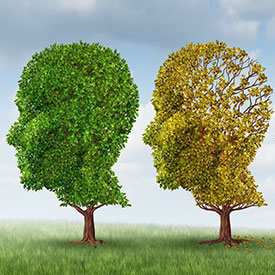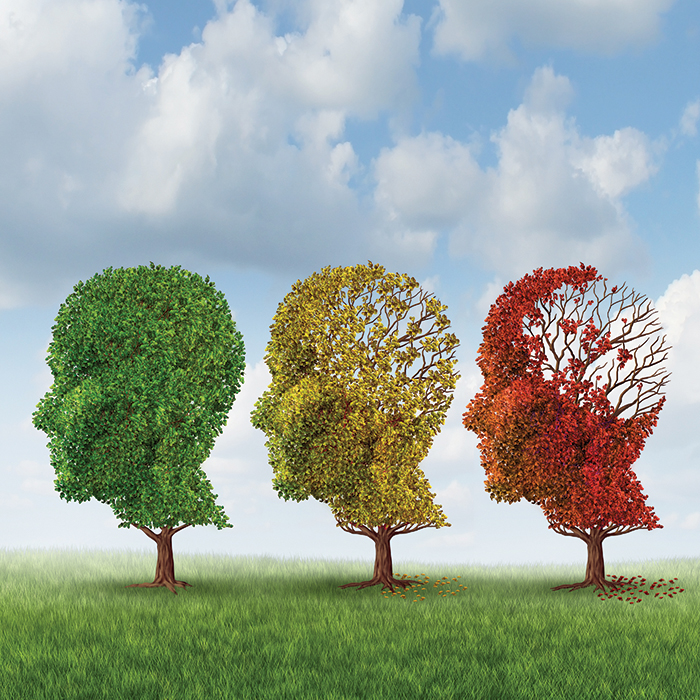 Alzheimer’s disease is called “the long goodbye” because of its particular cruelties. People with Alzheimer’s disease not only lose their memories and ability to function, but their personalities also often undergo profound changes—a different but no less painful loss for their loved ones. But thanks to the support of philanthropic partners, UAB researchers are untangling the mysteries of the disease with hopes to develop new preventive measures and treatments.
Alzheimer’s disease is called “the long goodbye” because of its particular cruelties. People with Alzheimer’s disease not only lose their memories and ability to function, but their personalities also often undergo profound changes—a different but no less painful loss for their loved ones. But thanks to the support of philanthropic partners, UAB researchers are untangling the mysteries of the disease with hopes to develop new preventive measures and treatments.
Earlier this year, the Gale Foundation made a generous $500,000 gift to establish the Rebecca Gale Endowed Professorship in the Department of Neurology, and the foundation has committed future gifts that will elevate the professorship to an endowed chair. The purpose of the gift is to help the department recruit and/or retain a national leader in Alzheimer’s disease care and research. Established by Rebecca and the late Edwin Gale of Beaumont, Texas, the Gale Foundation supports a variety of initiatives around education and human services, among other causes. “You can never go wrong doing the right thing,” says Rebecca Gale, a philosophy that influenced the Gales’ philanthropic giving.
“We are grateful for the support of the Gale Foundation in committing to establish the Rebecca Gale Chair in Neurology,” says David Standaert, M.D., Ph.D., the John N. Whitaker Endowed Chair in the Department of Neurology. “This endowment, which will remain with the university in perpetuity, will help us recruit, retain, and support the most talented physicians and scientists. It will allow them to focus their energy on developing treatments and cures for Alzheimer’s disease and other important neurological disorders. This is truly a gift that will change the future for the better.”
This spring, UAB created the Pre-Doctoral Scholars Program for Alzheimer’s Disease Research with a generous gift from the Alzheimer’s of Central Alabama Junior Board. The program supports two graduate students conducting Alzheimer’s disease research over the next three years.
 “This focused program is for pre-doctoral graduate students to study basic and translational approaches to Alzheimer’s disease,” says Erik Roberson, M.D., Ph.D., the Patsy W. and Charles A. Collat Professor of Neuroscience and director of the UAB Alzheimer’s Disease Center. “This unique emphasis will enable our students to take leading roles in therapeutic discovery across the spectrum of different skill sets and enterprises that are required to deliver the vitally needed treatments of the future.”
“This focused program is for pre-doctoral graduate students to study basic and translational approaches to Alzheimer’s disease,” says Erik Roberson, M.D., Ph.D., the Patsy W. and Charles A. Collat Professor of Neuroscience and director of the UAB Alzheimer’s Disease Center. “This unique emphasis will enable our students to take leading roles in therapeutic discovery across the spectrum of different skill sets and enterprises that are required to deliver the vitally needed treatments of the future.”
“Since Alzheimer’s of Central Alabama’s Jr. Board was established in 2015, they have attracted a dynamic group of young people who are both personally and professionally tied to the disease,” says Miller Piggott, executive director of Alzheimer’s of Central Alabama. “They are ambitiously raising money with two major annual fundraisers: Glow for a Cure, a nighttime golf tournament in August, and Ales for Alzheimer’s, a spring event at Avondale Brewery. In addition, they host an annual educational event for their peers. It is our hope that establishing the Pre-Doctoral Scholars Program for Alzheimer’s Disease Research at UAB can assist in recruiting the brightest, most promising graduate students to establish careers in Alzheimer’s research.”
In addition to the Pre-Doctoral Scholars Program, ACA has funded 24 research grants at Alabama universities since 2001, including 21 at UAB.
This summer, the New Neighbors League Club (NNLC) of Birmingham gave a $4,000 gift to the Alzheimer’s Research Program led by Jeremy Herskowitz, Ph.D., assistant professor in the Department of Neurology. The NNLC raised most of the money through a mah jongg tournament and fundraiser.
This gift will help sustain Herskowitz’s work to understand what causes Alzheimer’s at the molecular level and how those processes can be stopped or reversed. His past research efforts have included identifying an enzyme in the brain that may be an intriguing target for interventions against Alzheimer’s disease and other dementias. He has also been studying what differentiates people who have amyloid-beta and tau pathology in their brains but do not develop dementia from those who have dementia.
– Jane Longshore, Bennett Page, and Bob Shepard
To give to Alzheimer’s disease care and research at UAB, contact Katye Fuglaar at (205) 934-0792 or kcf@uab.edu.